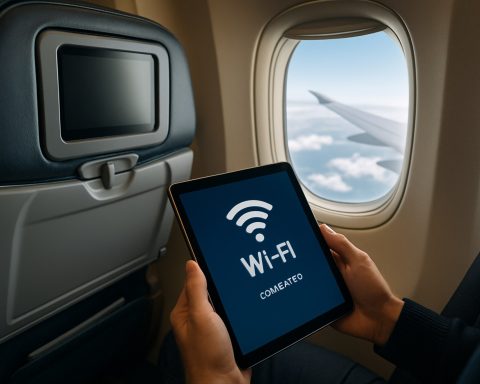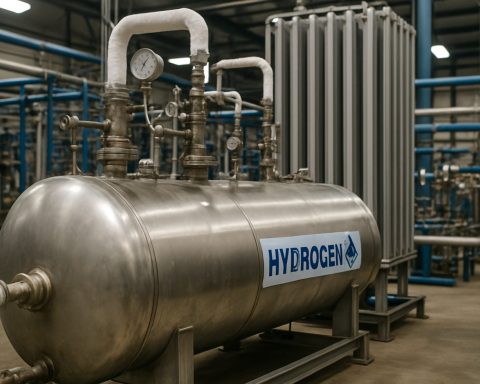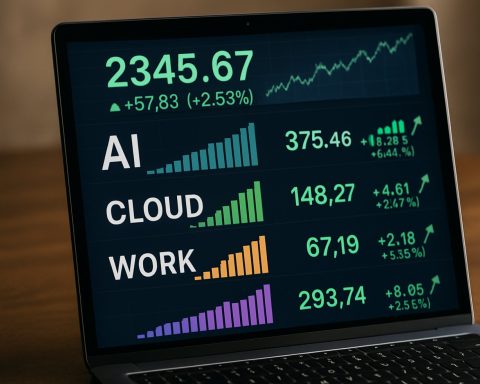- BYD’s BoYoboD is a solar-powered humanoid robot designed to transform household chores by performing tasks like laundry and cleaning.
- BoYoboD’s standout feature is its solar energy system, allowing it to recharge by aligning with the sun and exemplifying eco-friendly innovation.
- Beyond housekeeping, BoYoboD can charge electric vehicles, highlighting its role as part of a sustainable energy future.
- Priced at approximately $10,000, BoYoboD is available for pre-order at a lower price, with a launch planned for December 2025.
- This innovation raises important discussions about the future integration of robots in domestic spaces and potential impacts on employment.
- BoYoboD marks a significant step towards human-machine collaboration, blending ease and advanced technology for everyday life.
The world of tomorrow is inching closer, and BYD, a titan in the Chinese tech industry, is leading the charge with its latest innovation—a solar-powered humanoid robot known as “BoYoboD.” This newly minted household marvel promises to ease the burden of daily chores, transforming homes into efficient, futuristic abodes.
Picture waking up to find that your laundry is done, floors are spotless, and leaves are meticulously raked. BoYoboD is engineered to bring this vision to life. Clad with advanced artificial intelligence, it tackles an array of tasks from folding clothes to cleaning bathrooms, redefining what it means to have a helping hand at home.
What sets BoYoboD apart is its ingenuity in energy consumption. Equipped with a solar power charging kit, the robot can harness the sun’s energy, with a rooftop solar panel system that silently, and quite literally, keeps it powered by daylight. When its battery dips below a user-defined level, it simply steps out, aligns with the sun, and recharges—a testimony to human innovation meeting environmental consciousness.
Yet, BoYoboD isn’t just a nimble housekeeper. It’s savvy enough to plug electric vehicles for charging, showcasing an essential skill as the automotive world shifts gears towards sustainable energy. It doesn’t drive cars (yet), but considering its broad skill set, who knows what the future holds?
While the humanoid is priced at around $10,000 (73,000 yuan), early adopters in China can avail it at a pre-order price of 70,000 yuan before its official release. BYD aims to debut this groundbreaking gizmo in December 2025, with a grand unveiling slated for July where its design is expected to generate as much buzz as its functionality.
The emergence of BoYoboD invigorates the conversation surrounding the role of robots within domestic settings. As its market expands, the dialogue shifts towards how such innovations could reshape employment within maintenance and household management sectors. The prospect of affordable, productive humanoid robots poses profound questions—coupled with potential disruptions.
In the relentless race towards technological advancement, BoYoboD stands as a beacon of possibility, embodying both the promise of ease and the embodiment of technology crafted for everyday life. At its heart, BoYoboD is more than a robot; it signals a leap forward in the quest for seamless human-machine collaboration—a dream that now feels within arm’s reach.
Unveiling the Future: How BYD’s Solar-Powered Robot BoYoboD is Revolutionizing Home Management
Comprehensive Overview of BoYoboD’s Features
BYD’s BoYoboD represents a significant advancement in household robotics, integrating cutting-edge technology to revolutionize home maintenance. Below, we delve deeper into its features and implications that were briefly mentioned in the initial article.
Advanced Features & Technology
1. AI Integration: BoYoboD utilizes sophisticated AI algorithms to efficiently manage household tasks like laundry, cleaning, and even basic gardening. The AI enables it to learn and adapt to specific household routines over time, creating a highly personalized service.
2. Energy Efficiency: Its solar power capability is a standout feature. The robot’s solar charging kit aligns seamlessly with sustainable energy goals, reducing reliance on electricity and lowering homeowners’ carbon footprints.
3. Connected Home System: Designed to integrate with smart home devices, BoYoboD can interface with other appliances, providing centralized control over various home functions, including thermostat adjustments and lighting.
4. Enhanced Mobility: Its humanoid design enhances navigation within domestic spaces, allowing it to maneuver through different terrains and architectural layouts with ease.
Market Forecasts & Industry Trends
– Growing Market for Domestic Robots: According to a Statista report, the domestic robotics market is projected to grow significantly, with revenue reaching $4.6 billion by 2025.
– Shift Towards Renewable Energy: BoYoboD’s solar capabilities align with a global trend pushing for renewable energy solutions, providing a forward-thinking option for eco-conscious consumers.
Pressing Questions & Insights
1. How Does BoYoboD Support Sustainability?
With capabilities to harness solar energy, BoYoboD exemplifies sustainable living, significantly reducing its carbon emissions compared to traditional electronic appliances.
2. Implications for Employment:
While robots like BoYoboD automate household chores, there is a growing concern about their impact on domestic laborers. The conversation is shifting towards retraining and reallocating labor forces to more complex, skill-oriented roles within the tech industry.
3. Security Concerns:
As smart robots collect and process data, ensuring privacy and data protection is paramount. Users must understand data policies and utilize security features provided by BYD to mitigate risks.
Pros and Cons
Pros:
– Efficient task automation
– Reduction in energy consumption costs
– Integration with existing smart home systems
Cons:
– High initial cost
– Potential obsolescence with rapid tech advances
– Security and privacy concerns
Actionable Recommendations
– Consider Solar Upgrades: To maximize BoYoboD’s efficiency, households should evaluate their current solar infrastructure and consider enhancements.
– Evaluate Security Protocols: Review and customize security settings to protect household data.
– Embrace AI Learning: Encourage interaction with BoYoboD to optimize its learning algorithms and improve service personalization.
BYD’s BoYoboD symbolizes a pivotal leap in domestic robotics, providing a glimpse into the future of smart, sustainable living. While its innovations come with certain challenges, its potential benefits to efficiency, cost savings, and environmental consciousness are undeniable. As the world anticipates its official release, BoYoboD could redefine our approach to home management.
For more cutting-edge developments in technology, visit BYD.








